Shogo Nishiwaki (Sign language artist) – Storyteller of the appeal of deaf community
2025.04.08
Assistant store manager (ASM) of Starbucks Nonowa Kunitachi

2024.10.22
“Starbucks Coffee nonowa Kunitachi” opened in Tokyo’s Kunitachi city on June 2020, which is the first Starbucks signing store in Japan where sign language is used as the common language.
Satori is working there with great enthusiasm.
An atmosphere of “fun” overflowing from his whole body and a bright smile.
Satori provides customers with “unchanging customer service” and a “special place”.
Gentle eyes that melt people’s hearts. What is the light that lies ahead of him?
―What kind of child were you?
Satori In Hokkaido, where I was born, there are several schools for the deaf from kindergarten to middle school, but only one high school. I went to a school for the deaf in Kushiro City, where there were only a few students, so I didn’t have any classmates until middle school. There were 10 or less students for the entire school. Perhaps because of that, when I was little I often played alone, reading books and playing games. You might think I’m a quiet person when I say that, but that’s not the case! I liked to talk, so I talked to both my juniors and senior students, and I event went to the park by myself and play with kids I didn’t know. I still don’t know why she used that expression, but my mother once told me that “I am a child like a dinosaur”. I’m sure I wasn’t very quiet.

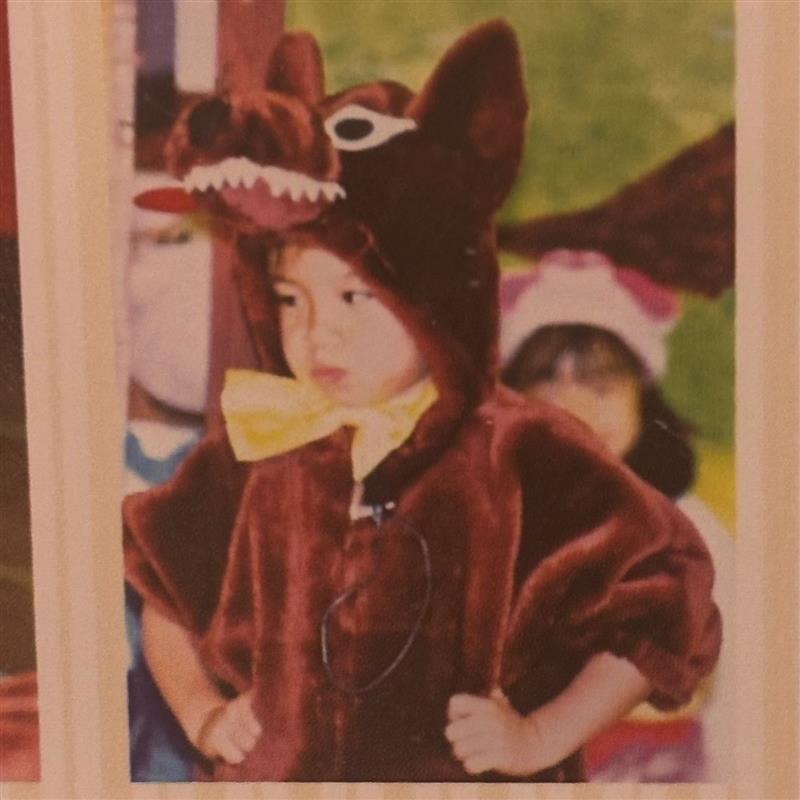
―You went to university at Tsukuba University of Technology (*) in Ibaraki, but what made you decide to leave Hokkaido?
Satori When I was in the first year of junior high school, I participated in a camp event where deaf children from all over the country gathered. I didn’t have any classmates at school, so it was my first time interacting with kids my age, let alone people living outside of Hokkaido. At that camp, I realized that there are so many different kinds of people in the world. For high school, I went straight to a school for the deaf in Hokkaido, but at that time I thought, “I want to be in an environment where I can meet many people”, so I went to a university in the Kanto region.
*Tsukuba University of Technology: The only university in Japan for the hearing or visually impaired. As Japan’s only institution for the higher education of hearing or visually impaired persons, their mission is to develop pioneering human resources who can contribute to society.
―What inspired you at camp?
Satori There were many games and projects, including group work. Deciding on a leader and determining roles within the group. I had never experienced this at a school for the deaf, so it was really refreshing. I realized it’s fun to do something with someone. It was a very exciting experience for me, who was often alone at the time, and it gave me a new feeling.
―What was it like being in an environment with so many classmates when you entered university?
Satori There are a lot of different people, and I listen to and talk about their past experiences and ways of thinking…. It was really exciting and a lot of fun. I’ve always liked to talk, so I got that feeling back at university as I didn’t have many opportunities to talk before. I had a few classmates in high school, but I was mostly alone for 15 years until middle school.
―What was your life like during your university days?
Satori I came out of Hokkaido with the desire to meet various people and go to various places, so I was very proactive such as getting a part-time job, participating in the activities of an organization for deaf university students, or joining a sign language club at another university. I made time to show up at various places…. There are many things that connected me now by moving proactively at that time. One of them was having a part-time job at Starbucks.

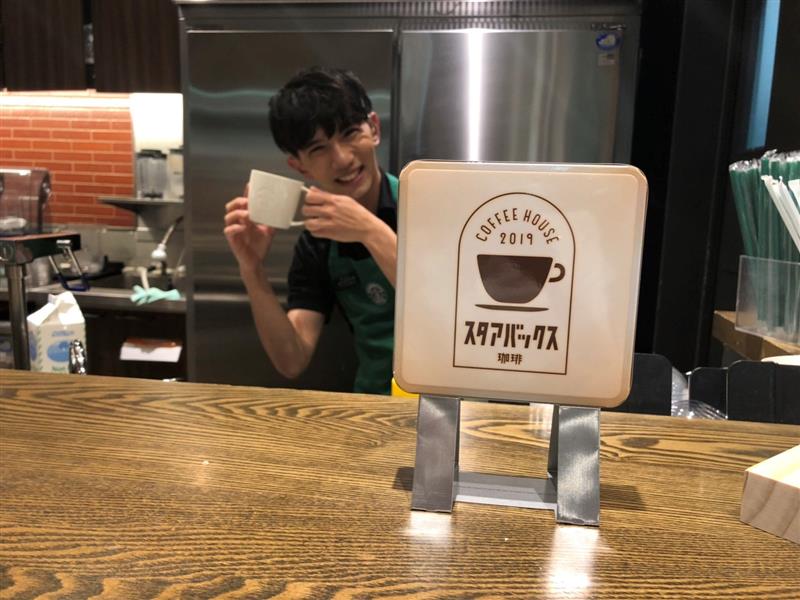
―Was Starbucks your first part-time job?
Satori Before working at Starbucks, I worked part-time at an izakaya for about three months in the spring of my first year of university. I chose to work at an izakaya because I like talking to people, so I wanted to work in a job that involved face-to-face customer service, and I was interested in making drinks and food. However, since I was mainly involved in washing dishes, I decided that I wanted to work in face-to-face customer service, so I quit that part-time job. After that, I saw a job opening at a Starbucks near Tsukuba University of Technology, where I was attending, so I applied.
―Have you been working at Starbucks ever since you started working part-time?
Satori I continued to work part-time until I graduated from university. When I was unsure of what to do after graduation, I decided not to job hunt because I had a strong desire to continue working at Starbucks where I could serve customers face-to-face. So after graduating, I continued to work as a part-time worker and got a job at Starbucks, taking advantage of the in-house system that allows partners with disabilities (At Starbucks, employees are called “partners”.) to receive the support they need. I’ve been working at Starbucks for about 9 years, including my part-time job…. And the reason why I came to Tokyo was to be involved in the opening of the Starbucks Coffe nonowa Kunitachi.
―Starbucks Coffee nonowa Kunitachi is the first Starbucks “Signing Store” in Japan. This is a store that uses sign language as the main means of communication, mainly for partners who are hearing impaired. What did you think when you heard that it was opening in Japan?
Satori The first Starbucks signing store opened in Malaysia in 2016 and is said to be the “world’s quietest Starbucks”. Actually, as soon as it opened, I was curious to see if it was different from other stores, so I visited the store. Then… I didn’t notice much of a difference. Even when customers are served by a partner who is deaf or uses sign language, customers are able to receive customer service smoothly without feeling uncomfortable. Of course, there are ways to communicate, but just because the language is different, whether it’s sign language or oral language, it doesn’t make any difference as long as you have a “hospitality” attitude towards the customers. One of Starbucks’ mission, promises, and values is “a brighter future for each and every person”. I remember coming home with a renewed sense that that was exactly the case, and that the goal was the same for all stores around the world. I’ve always wanted to open a store like this in Japan, so I was really happy when I heard that the Starbucks Coffee nonowa Kunitachi store would be opening as the first signing store in Japan. Moreover, I was very happy to be involved in the opening of the store.

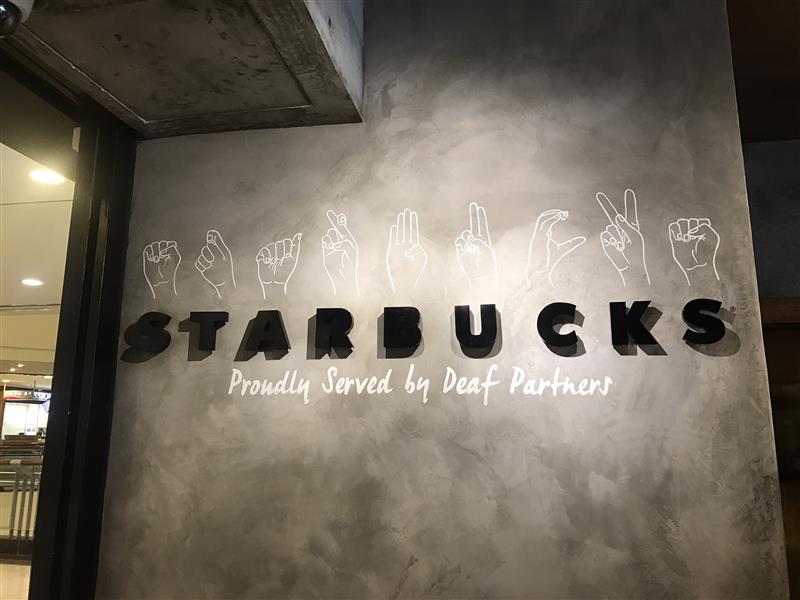
―You are currently in a responsible position as an ASM (Assistant Store Manager/Deputy Store Manager), but has your part-time experience been helpful?
Satori When I started working part-time, I had been living in the deaf world and there were very few opportunities to meet people who could hear. So you could say that serving customers at Starbucks was my first opportunity to interact with hearing people. To be honest, at first I didn’t know how to interact with the hearing people, so I had a hard time finding the courage to talk to them….
―Were you afraid to talk to them?
Satori Yes…. I know it in my head that all people are the same and it doesn’t matter whether you can hear or not. However, since I had no interaction with hearing people since childhood, I had a strong impression at the time that they were “people from a different world…”. So I didn’t know what to say or how to express it. However, when you actually muster up the courage to take a step forward, you realize that people who can hear and people who cannot hear just speak different languages, but the content they talk about and the topics they discuss are the same. Once we talked and got to know each other and realized that we had a lot in common, the fear disappeared. Now I truly feel that “we are all the same”.
―It was your part-time job at Starbucks that inspired you to take that step.
Satori When I started working there for the second year, the SM (store manager) was someone who believed in the idea that “those who want to take on a challenge should try as much as possible”, and was always supportive and kind. When I still didn’t have the confidence to communicate with hearing people, the store manager kept telling me, “You can do it! It will be alright!”. Thanks to that, now I feel that it’s really fun to interact with people and enjoy my work ! That’s why I’m able to work like this now. I am truly grateful, and I want to be the kind of person who can help someone take another step forward. That’s what I’m starting to think now.
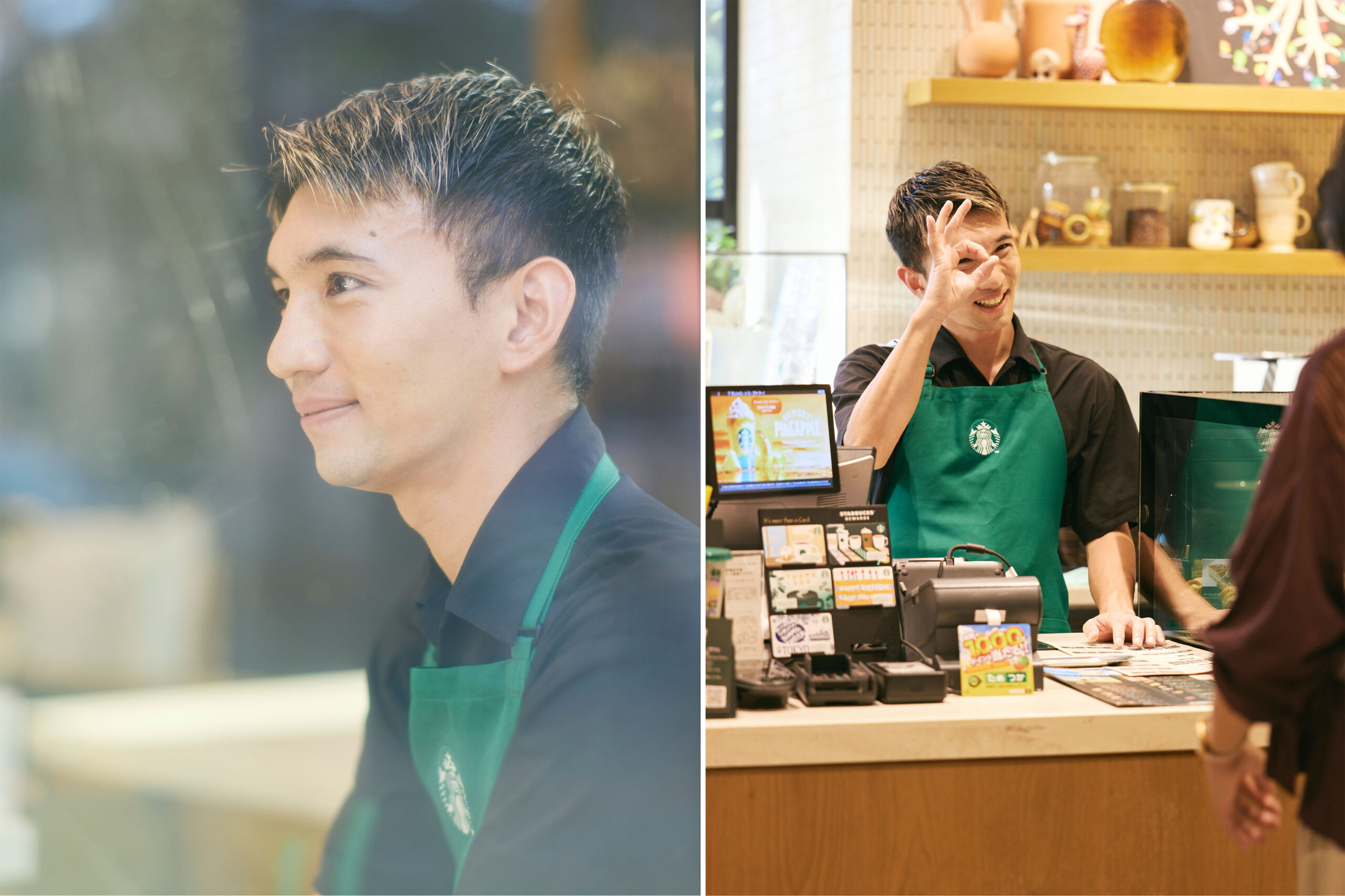
―What do you like about working at Starbucks?
Satori Of course, everything. But the fun part is being at the cash register and being able to communicate with customers. When the customers are unsure about what to order, I ask them what they are concerned about and think about it together. Making recommendations based on the customers preferences. I love talking to customers like that…. Not only about the menu, but also asking tourists where they come from, where they are going, and saying “good luck” to the people who work. Every interaction like that is fun.
In the past, a customer who was moving from this city went out of his way to say, “Thank you for always talking to me. I’ll come again if I have the chance”. I was really happy because I thought that by continuing to keep casual conversations had made it a somewhat “special place” for the customers.
―Are there many local customers at Starbucks Coffee nonowa Kunitachi?
Satori Many of our customers are local, but we also have many customers who come from far away on holidays. We have regular customers who have been coming to our store ever since it opened, and we are truly grateful for that. Some people even started learning sign language because of this store. I am very happy to be able to realize that they have become interested in sign language, and it is very rewarding.
―I think some partners may have the feeling that you felt when you first started working, “I’m afraid to talk to them”. What kind of advice do you give them?
Satori There are various reasons to be “scary”. Based on your past experience and background, you may feel that you are afraid to talk to them, or that you may not be able to talk to them, or that it would be better not to talk to them at the moment because the store is busy, or that you are trying to figure out the right time to talk to them and so on. Since each person is different, I ask each person what they feel scared or anxious about, and I give them advice on how to resolve it.
Communication with my partners is also an important part of my job. This fear and anxiety is felt the same way whether you can hear or not. Of course, I will also share what I have learned and my experiences, but I think the important thing to get rid of this fear is to “talk”. As we talked, we got to know each other and felt what was important to us. I am also trying to give the courage to make that move.

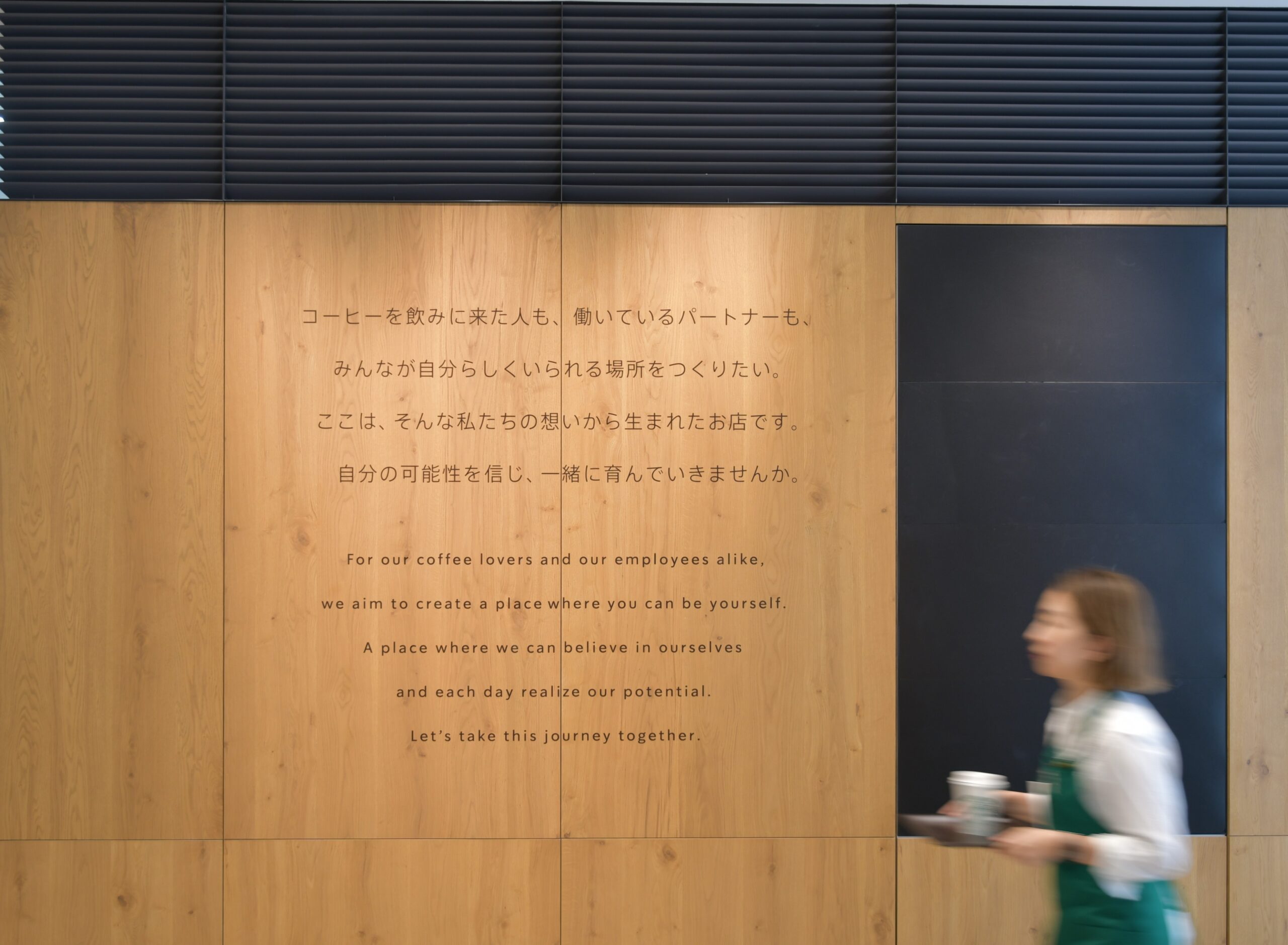
―What would you like to challenge in the future?
Satori I worked part-time and as a partner at Starbucks, and became an SSV (shift supervisor) in charge of time slots, and now work as an ASM (assistant store manager). At that time, there were no deaf people in the country who held positions higher than SSV, but I took up the challenge when the Nonowa Kunitachi store was being launched, and was able to become the first SSV. Therefore, my next goal is to become the first deaf SM (store manager).
Starbucks has a theme called “Social Impact (*)”. Starbucks Coffee nonowa Kunitachi store is one of these efforts, but our goal is to make something come true together by incorporating something extra of my own into the power that Starbucks has to change society. There is not many stores in Japan where deaf and hearing people work together and where a deaf person is the leader. I want to become an SM and make that happen. As a deaf person, I will take the lead and turn thoughts into action. I’m currently working hard to achieve that goal.
*“Social Impact” is the theme of Starbucks
In order to transform thoughts into action through the power of connections, we have continued to practice activities that value three things: “people”, “earth”, and “community” together with our customers, partners, and everyone involved since the early days of our founding.
From Starbucks Coffee official website: https://www.starbucks.co.jp/socialimpact/
―Nowadays, regardless of whether they have a disability or not, there are more and more people who feel like they don’t have a place they belong to or who are struggling to live their lives in their own way. What do you think about this?
Satori In order to live your own life, it is important to first be able to love yourself. In order to do that, I think it is necessary to self-analyze, know what you like and what is important to you, and face yourself.
Next, it is important to choose an environment that you feel is suitable for you. The important points in my self-analysis result was that I like meeting people, I want a job where I can communicate, and I want to be active in my own way. It may be difficult to control everything in your “environment”. If I had been in an environment full of people who thought that they couldn’t serve customers because they couldn’t hear, I wouldn’t have been able to work as myself as I do now. I was fortunate to find myself in an environment that understood my feelings and supported me. I think this is the result of trying out various things.
If the environment you are currently in is not what you are looking for, one option is to move to another location. Of course, there is a way to do your best and change the current situation, but I think that is very difficult. Because I have the experience of trying to change my environment, I realize that one option is to take the plunge and leave my current location and try somewhere else.
―It’s important to know your feelings and act on those feelings.
Satori Clarify your wishes and take action to make them come true. This leads to “being the person you like”. That’s why I think it’s so important to first know yourself, and then to love yourself.
―It goes without saying…but do you like yourself?
Satori Of course I do. I love myself. I think if you don’t like yourself, people won’t like you either. So, first of all, I will love myself!
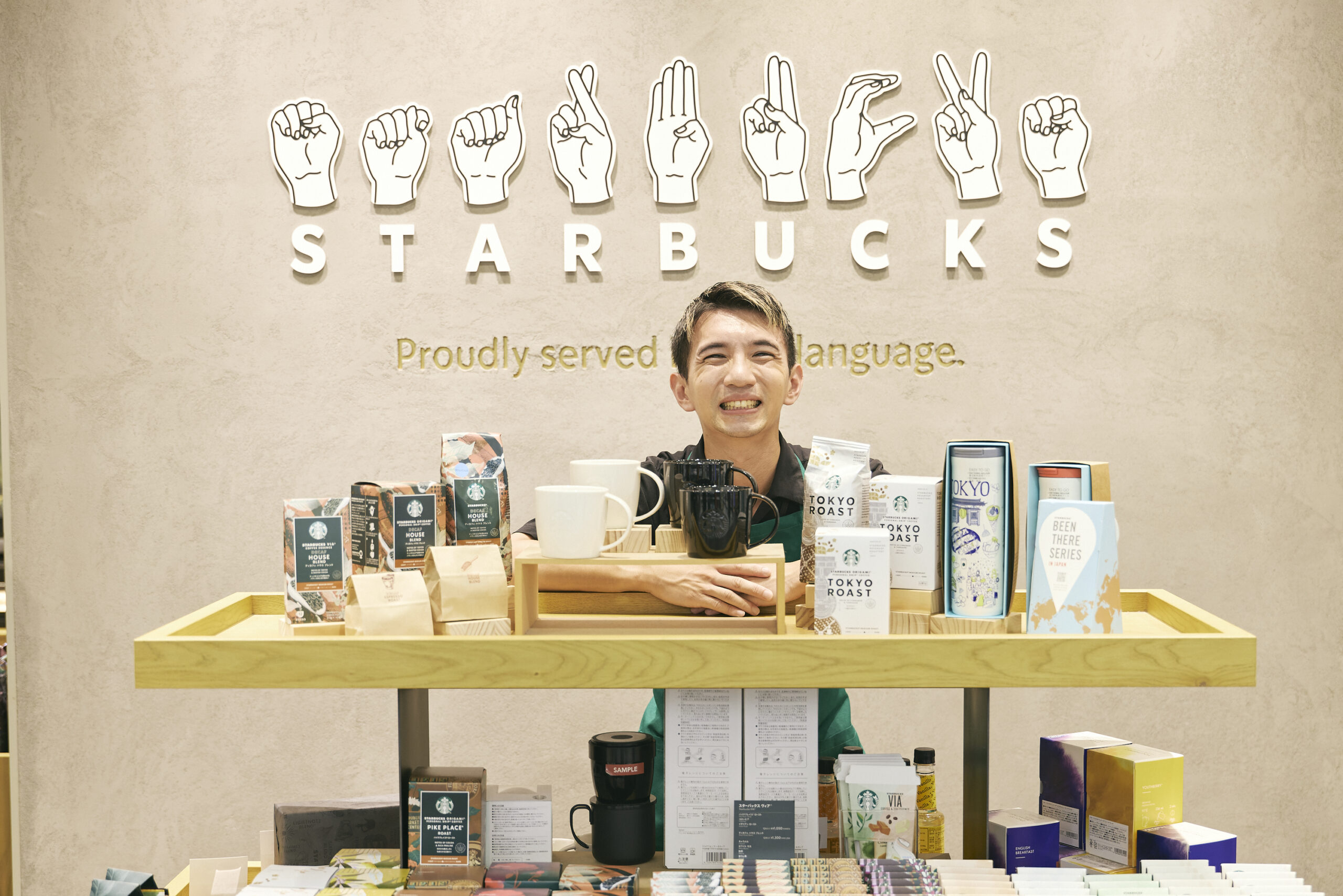
―In your private life, you communicate in sign language on SNS, but what are your thoughts on this?
Satori It’s not that I have a strong feeling to convey something! However, among people who can hear, there are still people who think of sign language as “welfare”, so I hope people will understand that sign language is not just “welfare” but “language”. Just like Japanese, sign language is a language, and although there are some differences in details such as grammar, both languages are communication tools. I hope everyone understands that.
Just as I had the impression that hearing people were “people from a different world” and “people who are difficult to interact with”, some hearing people view deaf people in the same way. However, when you take a step forward and start communicating with them, you realize that sign language and Japanese are just different languages, but they belong to the same world. Perhaps my greatest goal is to create a world where both spoken and sign language are commonplace.
―The Deaflympics will be held in Tokyo next year in 2025. Are there any athletes or sports that you are paying attention to?
Satori Deaf Athletics pole vault Sou Sato! He sometimes comes to the store. I met Sou Sato at an event called “Waku Waku Deaf Sports” when I was a university student. This event provides an opportunity for deaf children to encounter various sports through interaction with deaf athletes. I was supporting the management staff, and Sou Sato was participating as a deaf athlete. That’s how we met, and we’ve been friends ever since. I know many other deaf athletes, and I want to see them shine on this historic stage! Once the Deaflympics start, I think I’ll be busy every day cheering.
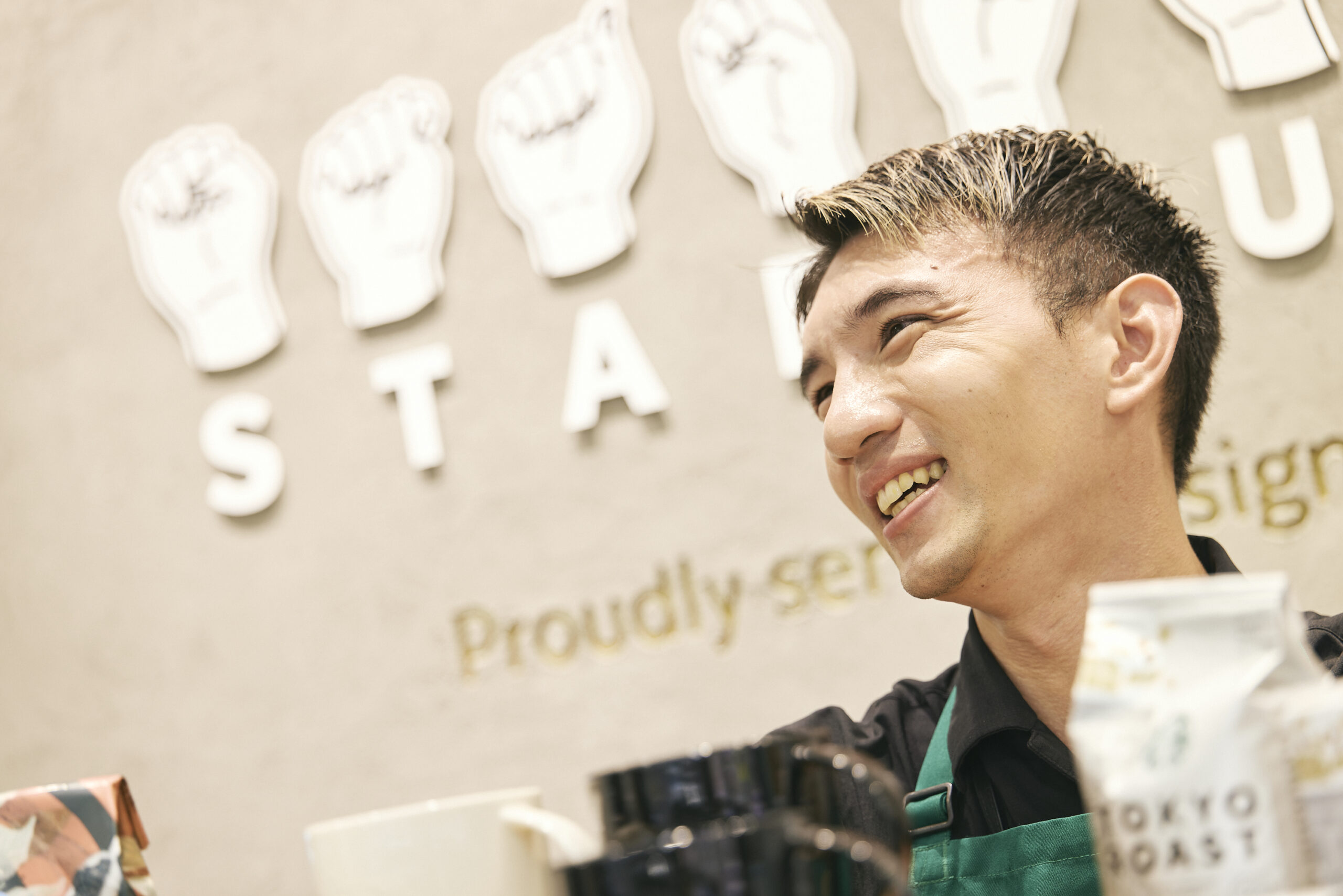
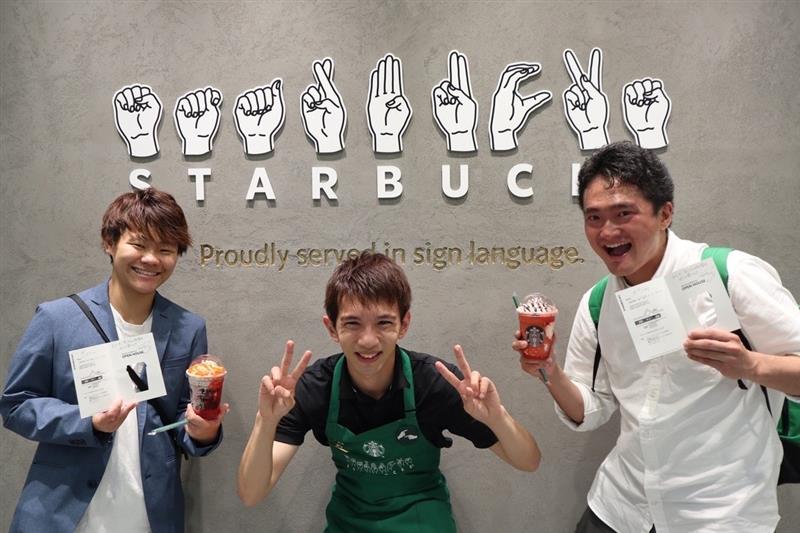
―What are your expectations for the Deaflympics being held in Tokyo?
Satori What kind of impact can it have on society? I am looking forward for that. Not too long ago, the popularity of the Deaflympics was around 10%. It may be a little higher now, but it’s still not well known…. I hope the Deaflympics will become more well-known, and interest and understanding of deaf people will advance by holding the event in Tokyo. I hope that this will expand the environment in which deaf people can play an active role, and that the barriers between hearing people and deaf people will gradually disappear.
―Finally, please give us a message for our readers who are looking forward to the Tokyo 2025 Deaflympics!
Satori When we talk about the Deaflympics, many different words are used, but one word that is always used is “person with a disability”. Please think again about the word “disability”. I believe that disabilities are not something that the person has, but something that exists in society. If a person who can hear sign language joins a community where sign language is the common language, the person who can hear may be treated as a person with a disability in a sense. Even if the individual does not change, what is called a person with a disability will change depending on society. If I went to a live performance venue, I would be a person with a disability, but if I work at this store, I won’t be. If you change your perspective a little, the meaning of words and the people and things they represent will change depending on the community. To be able to think about various words, including the word “disability,” from a different perspective. It would be great if the Deaflympics became an opportunity for that. Then, you might come across something more interesting. You may be able to see a society in which we can love ourselves more and love the people around us even more.

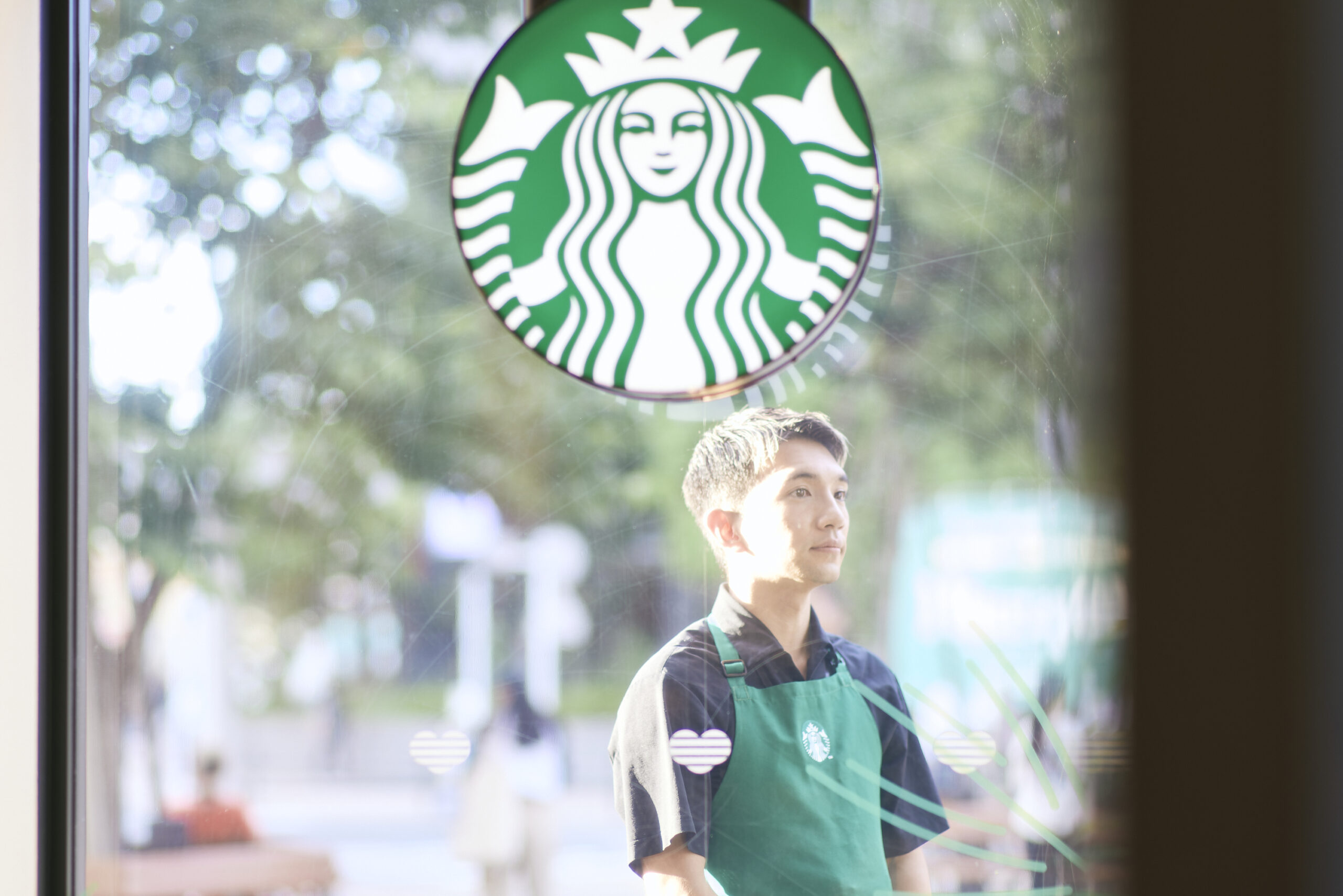
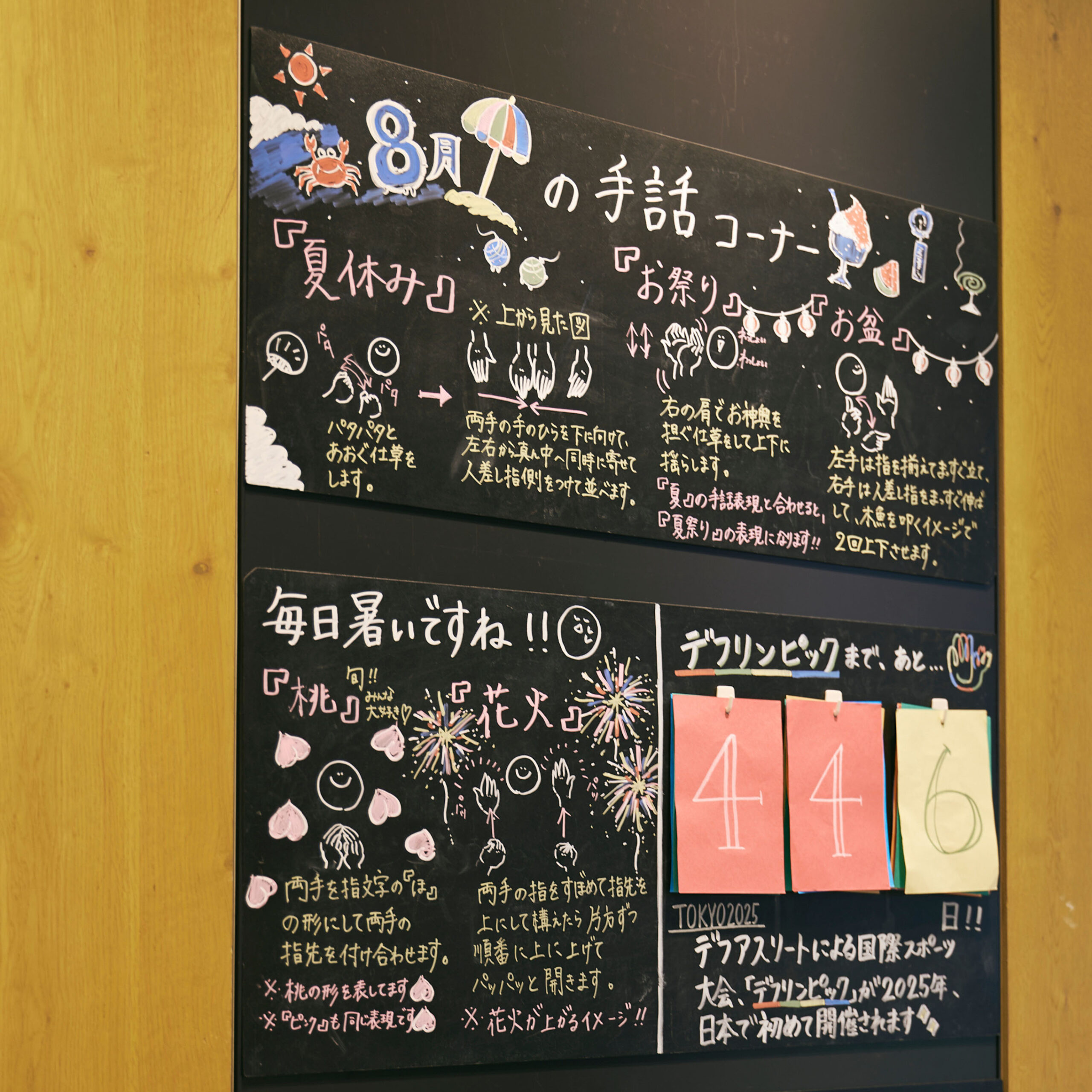
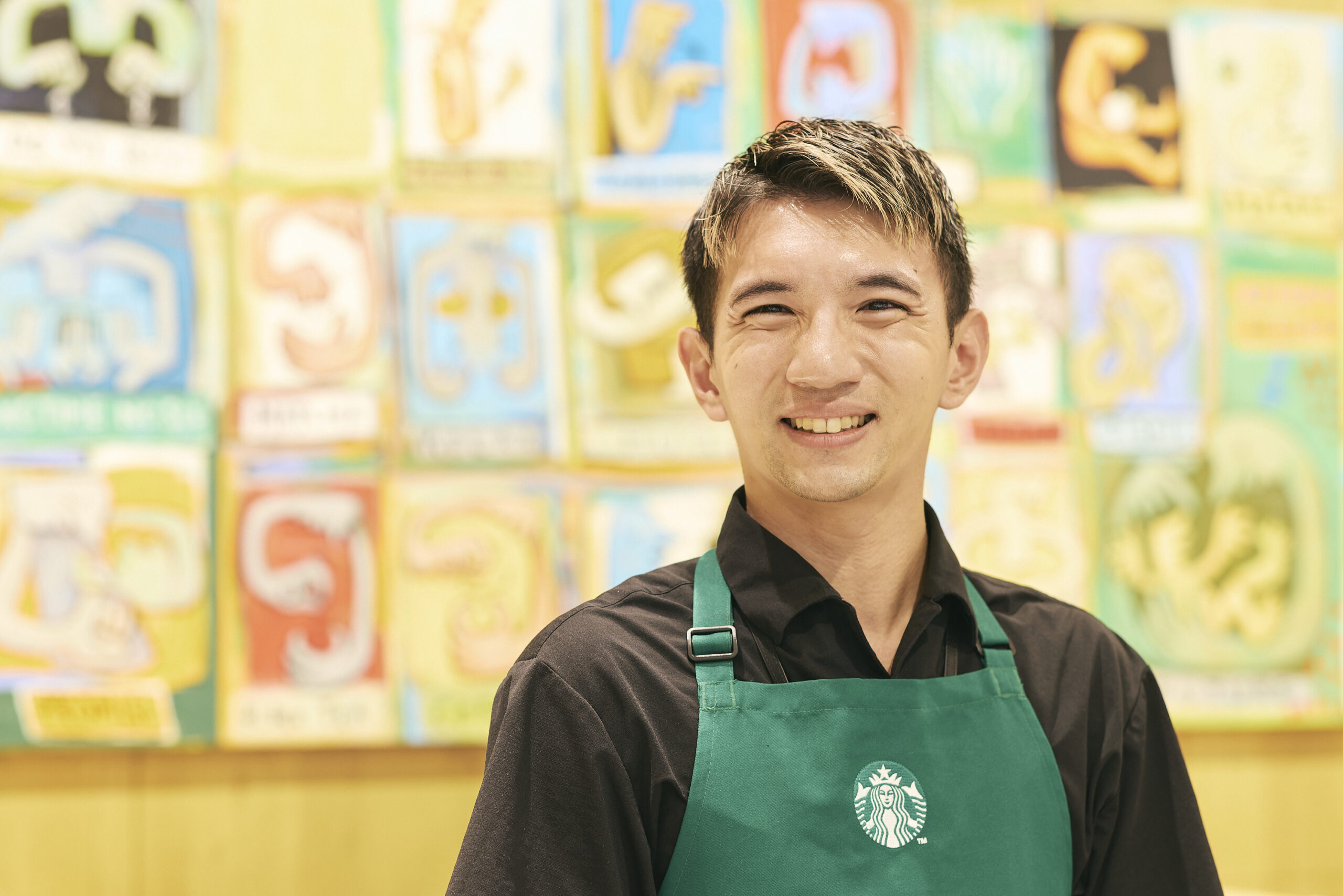
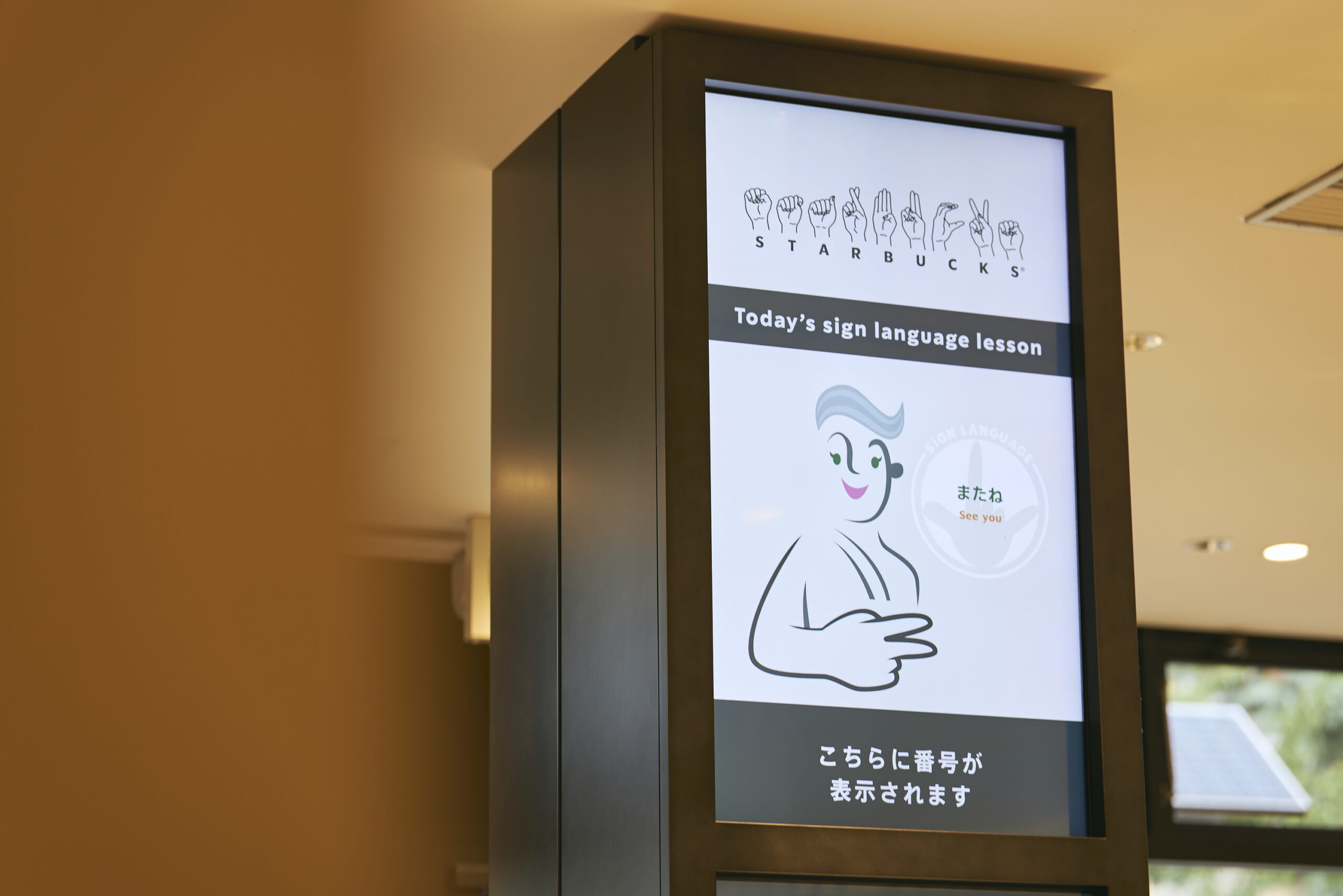
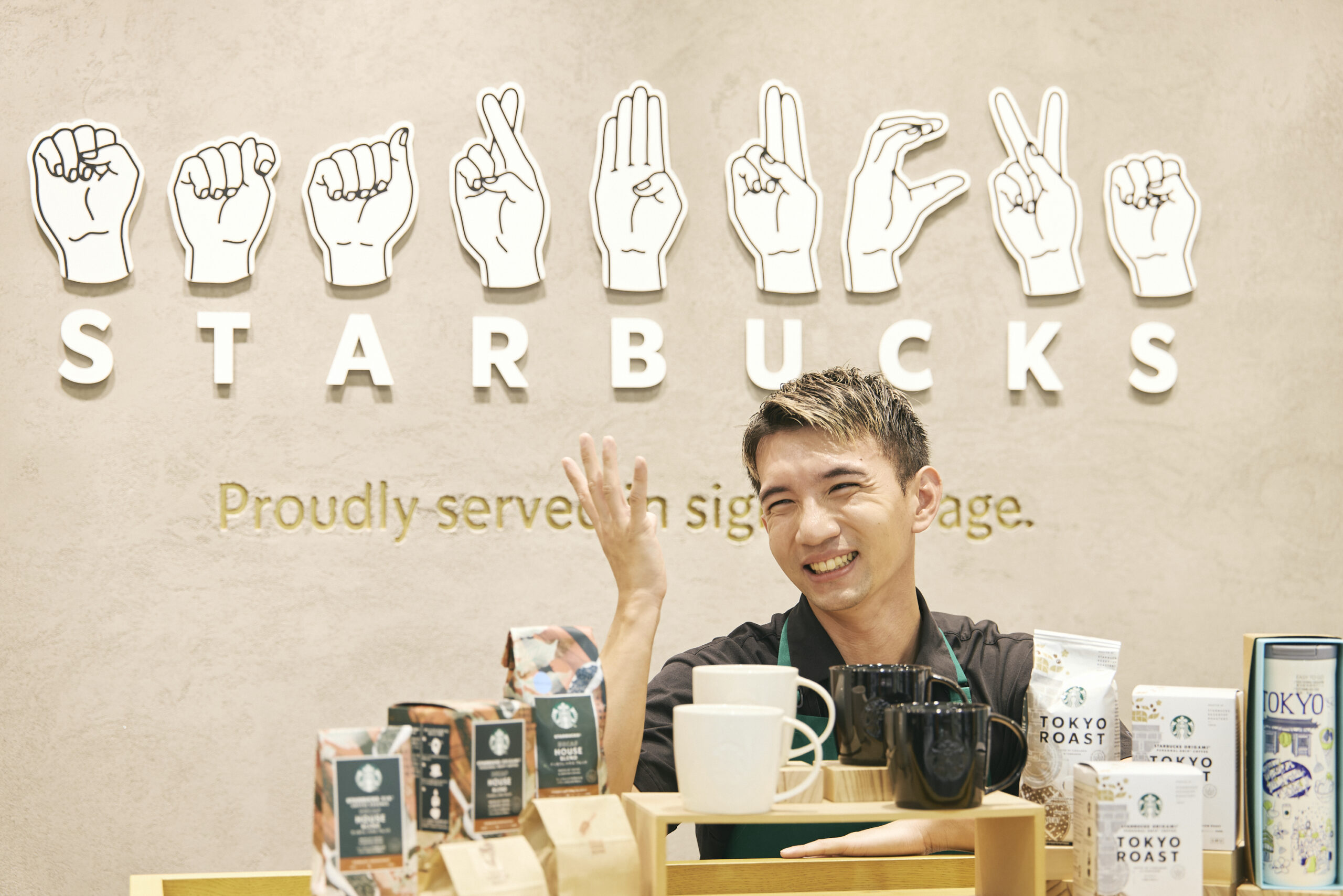
Satori / Born in Hokkaido
Starbucks Coffee nonowa Kunitachi Assistant Store Manager (ASM)
Born in 1995. “Satori” is a nickname abbreviating his real name.
Born in eastern Hokkaido, he attended a school for the deaf in Hokkaido until high school, and left Hokkaido to attend university at Tsukuba University of Technology in Ibaraki. He worked part-time at Starbucks during his university days and became an employee. Currently, he is an assistant store manager (deputy store manager) at Starbucks Coffee nonowa Kunitachi, a signing store where both hearing-impaired and non-hearing partners work together using sign language.
text by Rieko Kimura
photographs by Uta Mukuo
2025.04.08
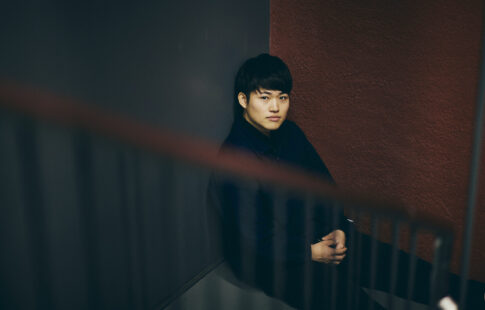
Eyes filled with conviction. Sign language in which thoughts are spun together. Growing up in a deaf world, le […]
2025.04.08
Eyes filled with conviction. Sign language in which thoughts are spun together. Growing up in a deaf world, le […]
2025.02.28
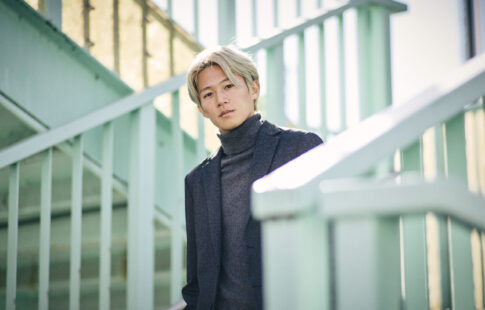
An influencer who is now widely accepted by the general public, Takaya Mitsuka. The dream stage that he arrive […]
2025.02.28
An influencer who is now widely accepted by the general public, Takaya Mitsuka. The dream stage that he arrive […]